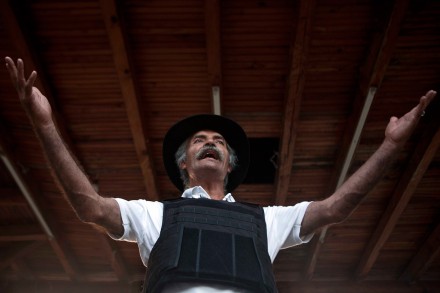The Threat of Mireles (07/14/2014)
Home
 Mireles durante la toma de Nuevo Urecho, Michoacán.
Foto: Germán Canseco
Mireles durante la toma de Nuevo Urecho, Michoacán.
Foto: Germán Canseco
Follow @gilolmos
MEXICO, DF (Proceso:Spanish José Gil Olmos (translated by Follow @ricardoblezama
) -
At this stage of the game, the false accusations directed at José Manuel Mireles by the federal government can only make one laugh. The Mexican federal government has orchestrated a series of falsehoods in order to justify Mireles' arrest. They seek to charge the leader of Michoacán's self-defense groups with possession of drugs, and possession weapons that are for exclusive use by the [Mexican] Army. The charges are so baseless that now they want to investigate his bank accounts.
The obvious fact is that José Manuel Mireles disturbs members of federal and state governments for many reasons, chief among them is the fact that he accused Michoacán's political class of having links to narco-trafficking. Specifically, Mireles publically accused interim former governor, Jesús Reyna, and Rodrigo Vallejo, son of former Governor Fausto Vallejo, of having drug ties. Mireles also refused to abide by the federal government's disarmament of Michoacán's self-defense groups. What is of most concern to the political class is the risk of more self-defense groups, like those in Michoacán, cropping up in other regions of the country that suffer from the ominous presence of organized crime.
Since January 2013, that is to say just one year after he became president, Enrique Peña Nieto looked with concern at the blossoming of self-defense groups and community police. In four towns of Guerrero's Costa Chica region, people decided to take up arms to defend themselves against organized crime.
However, the issue of self-defense groups and community police in various parts of the country has been widely known for some time. Since 2011, these self-defense groups have surfaced as an expression of public dissatisfaction with the government's drug-war strategy. This was especially true for indigenous people who resent their own general insecurity and their victimization by organized crime.
According to one journalistic review, 36 citizen and community self-defense groups were organized in eight states in 2011: 20 in Guerrero; 4 in Michoacán; 3 in Morelos; 2 in Oaxaca, Veracruz, Chihuahua, and in the states of Mexico and Jalisco.
Today, we can add more self-defense groups to this tally in the same states mentioned and in others too. New groups have arisen in Mexico City D.F., San Luis Potosí, Hidalgo, Zacatecas, Puebla, Tlaxcala, Sinaloa, Colima and Tabasco. All in all, more than 100 self-defense groups! Michoacán alone has 37 self-defense groups and community police officers that have surfaced in the past three years, some spontaneously and temporarily, but others permanently. All of them are armed.
José Manuel Mireles has proven an inspirational figure to towns in Michoacán and other states trying to build their own self-defense groups. This is what is most frightening to the federal government since there has not been any substantive progress in the fight against insecurity and violence in México. Meanwhile, Peña Nieto continues Calderón's war on drugs.
The arrest of Mireles is really a thinly veiled message to those who intend to follow his defiant example. The federal government wants the public to know that they have no allies in their bid for armed self-defense against organized crime.
The federal government also shows implicit support for organized crime by removing civilian opposition in strategic areas. The arrest of Mireles occurred immediately after he announced that a self-defense group would operate in the town of Lázaro Cardenas - a logistical hub for cartels - which contains México's most important port, and from where large quantities of drugs and minerals are shipped.
Assuming control of existing self-defense groups and converting them into 'rural military police' in Tierra Caliente, Michoacán is not enough for the federal government. There are many communities and entire municipalities refusing to give up their self-defense groups. Similarly, the federal government has also attempted to co-opt Guerrero's main self-defense group, the community police of the mountains, which has existed since 1996.
Even though Mireles is in jail, even though his mustache and hair have been removed as part of an effort to undermine his public image, as long as there is violence and insecurity, as long as organized crime controls vast amounts of land and people, and as long federal and state governments continue to display incompetence in performing vital functions, communities will continue to see self-defense groups as viable options.